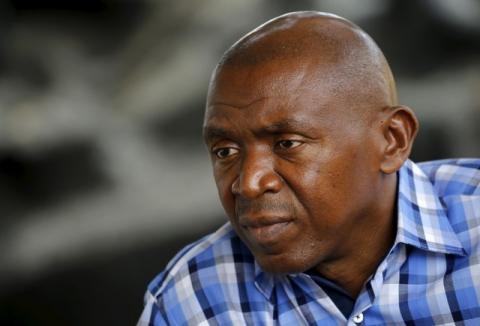Advertisement
Burundi's top opposition leader Rwasa says fears for his life
CAPE TOWN (Reuters) - Burundi's top opposition leader said he feared for his life as violence mounted following President Pierre Nkurunziza's disputed election to a third term in office.
Agathon Rwasa, a former rebel leader like Nkurunziza during Burundi's civil war, told Reuters he constantly feared ambush and regularly changed his travel plans.
“I personally am targeted from everywhere. I don’t know who can hit me first and I’m sure that the one who succeeds in doing so will try to blame it on someone else,” he said while attending a conference in Cape Town.
“My safety and the safety of many Burundians is not guaranteed,” he said, stressing that he would not seek asylum in South Africa but would return home to his family.
Nkurunziza and his supporters say his re-election was legitimate under the constitution.
President Paul Kagame of Rwanda, a neighboring state that was torn apart by genocide in 1994 and shares the same ethnic mix, has implored Burundi to avoid sliding into ethnic conflict. Burundi dismissed Kagame's remarks as "indecent and unfair."
Awash with guns, simmering violence in Burundi has stoked international concerns about a new conflict erupting in a country where an ethnically-charged civil war ended just a decade ago after 300,000 people were killed.
In the capital Bujumbura, armed vigilantes patrol at night in a city plagued by killings and violence six months after thousands took to the streets to oppose the president's re-election.
A relaxed-looking Rwasa, who has called for dialogue with Nkurunziza as the best way to reduce tensions, spoke of an incident two weeks ago.
"I heard that there was a pick-up with guys in uniforms and equipped with RPG's and machine guns. That car didn't have number plates and stood there for about three hours and I was obliged to divert and go around another place," he said.
"They shifted and went to the route they thought I would be utilizing, but I managed to divert and reach my point I was heading to," he added.
Rwasa said Burundi was in danger of descending into chaos.
"Either we are wise enough and accept genuine dialogue or we become stubborn, and one may rely on his weapons or his money or whatever, then there is a high risk of Burundi becoming like Somalia of the 90's," he said.
(Reporting by Wendell Roelf; editing by Ralph Boulton)



















Add new comment